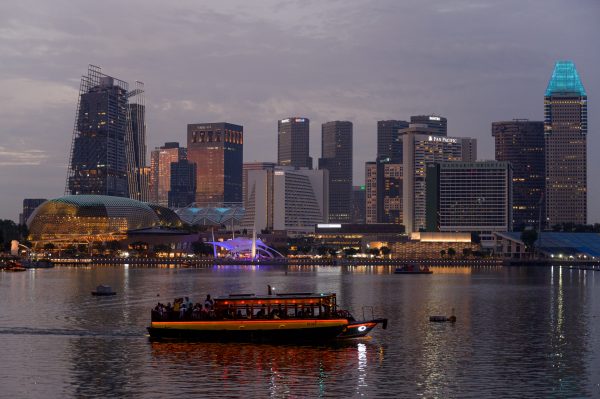Nor is there much doubt about who has been the smartest person and most imaginative reformer in Singapore’s Cabinet in recent decades — also Tharman Shanmugaratnam. Since the government suffered electoral setbacks in the 2011 parliamentary and presidential elections, Tharman has been credited with pushing the government to modify its longstanding aversion to welfare and introduce modest support for the elderly and the poor. These measures have not been sufficient to resolve the government’s electoral problems, but they have at least stopped the haemorrhage.
Tharman also has another political advantage — he is utterly faithful to the most powerful patron in the country, Prime Minister Lee Hsien Loong. His patron–client relationship with Lee began in the 1980s when he worked for the Monetary Authority of Singapore. Tharman has been investigated by authorities over security concerns on three occasions, but these tight spots have not been allowed to adversely affect his political career.
Opinion polls routinely name Tharman as the best candidate for prime minister. This is particularly so since Lee announced in 2017 that he planned to step down in 2019, not withstanding the reality that more than five years later, Lee remains prime minister.
Given his popularity and mastery of economics and public policy, Tharman should have been an obvious candidate to succeed Lee. But in 2008 Lee declared that only a candidate from Singapore’s majority Chinese community was acceptable. This verdict was confirmed in 2019 by Lee’s then-designated successor, Finance Minister Heng Swee Keat. In the same year, Tharman stepped down as Deputy Prime Minister to make way for Heng. This is the lot of a talented Indian in Singapore’s supposedly meritocratic society.
On 8 June 2023, Tharman announced that he was stepping down from Cabinet to run for President later in the year. This should not have been a surprise, given that he had no prospect of advancement in Cabinet.
Despite being a notionally apolitical position, the presidency has become something of a sinecure for former Deputy Prime Ministers amenable to a lucrative soft landing. There are a set of reserve powers attached to the position, but there is no clear mechanism for these to be exercised, so the role is not very onerous.
The choice of Tharman for President arguably solves several problems for Lee. The presidency provides an august reward for Tharman’s loyalty and stunted executive mobility. Tharman’s popularity also guarantees Lee will not be embarrassed by the spectacle of an establishment candidate almost losing to a strong alternative candidate. This nearly happened in the presidential election of 2011. The risk had already been reduced by the government’s successful effort to drive Lee’s estranged brother, Lee Hsien Yang, out of the country under threat of legal harassment.
Tharman’s loyalty to Lee ensures there will be no repetition of the awkwardness of 1993–1999, when another former deputy prime minister, President Ong Teng Cheong, stunned his former colleagues by taking his constitutional duty to protect Singapore’s capital reserves seriously.
But if the advantages to Lee are clear, so are the disadvantages. Lee loses the input of an innovative economic and public policy wonk in Cabinet. This loss comes at a time when Singapore’s government is facing a potential electoral blowback over unpopular housing policy reforms. The government is also struggling with cost-of-living issues, the prospect of a deteriorating economic outlook and a growing list of scandals.
These scandals risk creating the perception that the government might be protecting establishment figures implicated in white-collar crime. The full force of the law and public humiliation appears routine for ordinary, unconnected Singaporeans, but those engaged in multibillion-dollar bribery and largescale fraud can have their identities protected — and receive little more than a slap on the wrist.
Lee also loses Tharman as a campaigner in the next parliamentary election, which must be held by the end of 2025, but is likely to come much earlier.
Lee could have kept Tharman’s talent and popular profile in Cabinet and on the campaign trail if he had been willing to appoint him as Singapore’s first non-Chinese prime minister. But racial considerations pushed that option off the table, leaving the presidency as the consolation prize.
Michael Barr is Associate Professor of International Relations at Flinders University and a Deputy Editor of Asian Studies Review. He is author of ‘The ruling elite of Singapore: networks of power and influence’ and ‘Constructing Singapore: Elitism, Ethnicity and the Nation-Building Project’.


The PAP faces a challenge to find heavyweights Ministers to lead the GRCs in the next GE. Several Ministers will be gone or likely to step down due to events… Tharman, former speaker Tan, Iswaran, Teoh (due to age), maybe even Vivian and Shan due to the rental properties. Another Minister has just been fitted with a stent for heart issues. Also Heng who stepped down from being the potential next PM.
GRCs are safe parachutes for incoming novices. Some are from the military. Without heavyweights, hard to tell which way the votes will go.